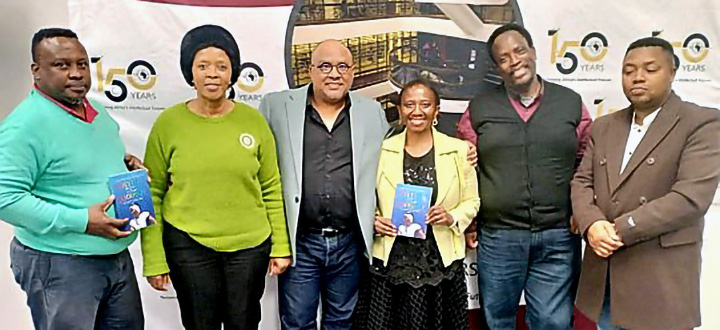News & Events
Celebrating National Book Week in Cape Town: A conversation with Millicent Lindiwe Ndaba
This year’s National Book Week at the Unisa Western Cape Branch Library was nothing short of remarkable.
On Wednesday, 18 September, the Unisa Cape Town Branch Library presented a talk in celebration of National Book Week. The acclaimed leadership strategist and author Lindiwe Ndaba launched her book, The Reciprocal Relationship of Culture and Leadership, at the newly unveiled recording studio at the Unisa Cape Town campus. Jacques du Toit, a fellow humanitarian leadership strategist and alumnus of the Thabo Mbeki African School of Public and International Affairs, served as the host for the event.

Regional staff attended the Western Cape Unisa Library regional event as part of National Book Week. Left to right: Mduduzi Ncongwane (panellist), Geraldine Cele (Manager: Cape Town Library), Jacques du Toit (Host), Millicent Lindiwe Ndaba (author and special guest), Matthew Ndaba (special guest), and Lonwabo Gobeni (programme director)
Ndaba’s book explores the reciprocal relationship between leadership and culture, highlighting the need for leaders to adapt to and shape the evolving cultural landscapes in modern organisations. With a contextualised perspective, this exploratory study in South Africa reveals the power inherent in this interplay and how interactions can impact the effectiveness and efficiency of leadership.
In her opening statement, Ndaba noted that Africa has much to offer the world, in that its leadership culture is incredibly unique and may provide solutions to the wars engulfing the globe. In her critique and explanation, she asserted that leadership through an African lens should pioneer change by embracing forward-thinking, challenging roles and identities, while also valuing the wisdom and ontology of African thought.
Ndaba explained how management and leadership should interact to achieve transformation, emphasising that change should enhance both local and global perceptions and efforts related to leadership for the greater good. “Transformation is not about changing the culture of organisations per se,” she said, “but about addressing the fundamental tenets of an outdated worldview that compels us to confront a much deeper structure of leadership. Transformation and culture should also foster a participatory process of creative collaboration, resulting in mutual benefits.”
In response to host Jacques du Toit’s question about whether culture is organisation-specific, Ndaba explained that leadership encompasses an understanding of the psychological, organisational, spiritual, and social aspects of the world. This understanding allows for a much deeper level of reflection, especially in rethinking organisational identity and discourse. “Thus,” Ndaba continued, “African leaders should raise awareness of how philosophies, lenses, and epistemologies are linked to the interpretation of leadership within the context of what is considered uniquely African, particularly regarding race, gender, status, and culture.”
Ndaba capably responded to all the host’s questions to demonstrate that leadership within the African context should be rooted in ubuntu. She believes that Africa has much to offer the world because its leadership culture is incredibly unique and may even provide solutions to the wars engulfing the globe. She described various leadership styles, from situational to transformational, and emphasised that leaders should “mirror” the people they lead to free themselves from unnecessary stress. She simplified leadership to the point where anyone felt they could lead and dispelled the belief that leaders are born.
The Library Services manager, Geraldine Cele, gave the closing remarks. She raised the question of why leadership is not integrated into the schooling system so that it can serve as a platform to foster human growth and identity. Ndaba indicated that Cele’s specific stance would be integrated into her next body of work. The host, co-host, audience, and organisers were all thanked for their hard work, given that the event was organised in a matter of days considering a tight second semester schedule. The author was also thanked for immediately agreeing to launch her book at the University of South Africa's Western Cape campus.
Ndaba’s book, ‘The Reciprocal Relationship of Culture and Leadership’, is available on Takealot and Amazon and will soon be available in local bookstores.
* By Mduduzi Ncongwane, Unisa Western Cape
* * Photography by Wilhelmina Zaal, Unisa Western Cape
Publish date: 2024/10/29
